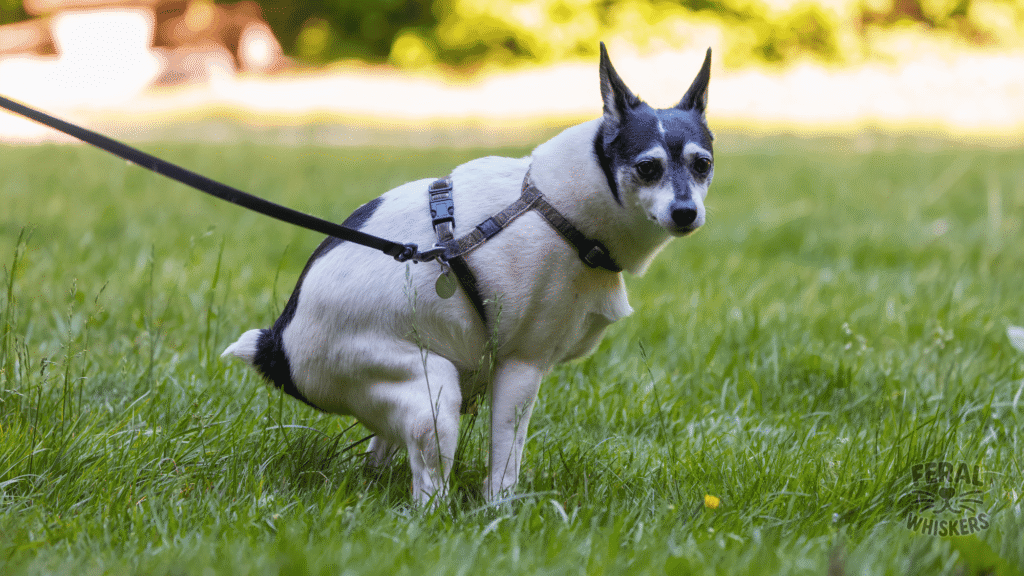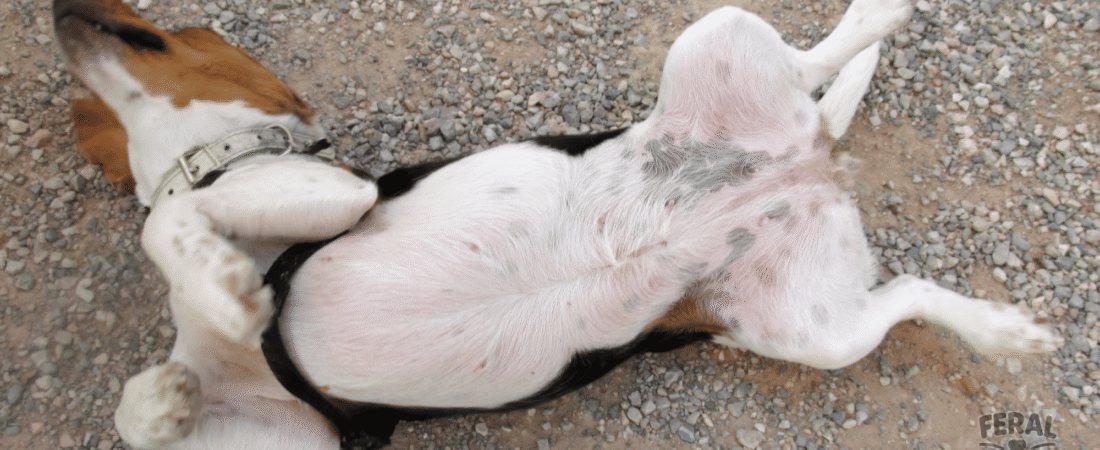📌 Why Digestive Upset is So Common in Dogs

Few things worry dog parents more than a pup with tummy trouble. A sudden bout of diarrhea, straining without results, or changes in stool are among the most common reasons owners rush to the vet.
Most of the time, though, digestive upset is mild and temporary — caused by a stolen snack, a quick diet change, or a stressful event. And with the right approach, many cases can be safely managed at home using natural, holistic remedies that both soothe symptoms and strengthen gut health long term.
👉 This article is your complete guide to understanding symptoms, causes, remedies, and prevention of canine diarrhea and constipation — written with a holistic, whole‑dog care mindset.
🦠 Common Causes of Digestive Upset in Dogs
Digestive issues aren’t random — they often reveal lifestyle, diet, or health imbalances.
Diarrhea Triggers:
- Dietary indiscretion (a.k.a. garbage gut): Eating spoiled food, table scraps, or high‑fat snacks.
- Abrupt food change: Sudden switch to a new diet shocks the microbiome.
- Parasites: Giardia, worms, coccidia common in puppies and outdoor dogs.
- Infections: Bacterial (salmonella, E. coli) or viral (parvo in unvaccinated pups).
- Stress & anxiety: Cortisol release speeds gut transit, leading to nervous diarrhea.
- Allergies/sensitivities: Foods like chicken, beef, dairy, wheat.
- Medication side effects: Especially antibiotics and NSAIDs.
Constipation Triggers:
- Low fiber diet: Processed kibble with little natural bulk.
- Dehydration: Dry food + low water intake.
- Too many bones or chews: Especially in raw‑fed dogs.
- Older age: Slowed digestion and weaker muscles.
- Sedentary lifestyle: Lack of exercise lowers gut motility.
- Pain or obstruction: Enlarged prostate, tumors, swallowed objects.
🔎 Recognizing the Symptoms
Understanding the type and quality of stool tells you a lot about what’s happening inside.
🚨 Symptoms of Diarrhea
- Loose / Watery Stools:
From soft-serve-like piles to pure liquid. Chronic cases can cause dehydration.
- Urgency & Increased Frequency:
Dogs may beg to go outside repeatedly or have accidents indoors.
- Changes in Color:
- Yellow/green: Bile imbalance, infection, or rapid gut transit.
- Dark tarry (melena): Possible digested blood; serious.
- Bright red streaks: Fresh blood from large intestine.
- Mucus covered: Often colitis.
- Accompanying Symptoms:
- Vomiting, drooling, gas → deeper GI upset.
- Fever, weakness, loss of appetite → possible infection.
- Sunken eyes, tacky gums → dehydration.
💡 Mild diarrhea that resolves within 24 hrs is usually safe to monitor with home remedies. Persistent/bloody cases warrant a vet exam.
🚨 Symptoms of Constipation
- Straining Without Producing Stool:
Dog crouches and pushes repeatedly with little or no result.
- Dry, Pebble-Like Stool:
Small, hard pieces indicate dehydration or too much bone.
- Reduced Frequency:
Skipping >1 day consistently can be a red flag.
- Discomfort & Bloating:
Whining, restless pacing, swollen belly.
- Loss of Appetite / Vomiting:
Severe constipation or impaction can back everything up.
⚠️ If constipation lasts beyond 2 days, stool is bloody, or your dog is in pain → vet visit ASAP.
🌿 Holistic Solutions for Diarrhea
Holistic care aims not just to stop diarrhea but to heal the gut ecosystem.
1. Temporary Bland Diet Reset 🍲
- Recipe: Plain boiled white rice + boiled lean chicken, turkey, or white fish.
- Serve small portions, 3–4x/day.
- Add 1–2 tsp pumpkin puree for stool regulation.
✨ Pro Tip: For sensitive dogs, substitute rice with mashed sweet potato or squash for easier digestibility.
2. Pumpkin Puree (the Super Remedy) 🎃
- Works for both diarrhea and constipation thanks to its soluble + insoluble fiber combo.
- Dosage:
- Toy breeds: 1 tsp
- Medium dogs: 1 tbsp
- Large breeds: 2–3 tbsp
3. Slippery Elm Bark Powder 🌱
- Coats inflamed intestinal lining, reducing irritation.
- How: Mix ½ tsp (small) to 1 tsp (large) in warm water, forming gel. Add to meals.
4. Bone Broth & Hydration Support 🥣
- Restores electrolytes, amino acids, and hydration.
- Great for picky eaters with low appetite.
- Freeze into ice cubes for hot weather hydration.
5. Probiotics & Prebiotics 🦠
- Restore balance of beneficial bacteria.
- Foods: kefir, plain unsweetened yogurt.
- Supplements: canine-specific probiotic powders with multiple strains (Lactobacillus, Bifidobacterium).
- Prebiotic sources: banana, asparagus, chicory root, pumpkin.
6. Rice Water (Gentle Binding Remedy) 🌾
- How: Boil white rice in water (2–3x water to rice). Strain and cool liquid.
- Function: Calms gut, replaces fluids, mild binding effect.
🌿 Holistic Solutions for Constipation
1. Fiber Boost
- Pumpkin again!
- Alternatives: steamed zucchini, green beans, oat bran, psyllium husk.
- Psyllium: ½ tsp added to wet food once daily.
2. Hydration Hacks 💧
- Hydrated dogs poop better.
- Add warm water or broth to meals.
- Use pet fountains to encourage natural drinking.
- Water-rich snack: cucumber slices, watermelon (seedless), celery.
3. Exercise for Gut Motility 🐕🦺
- Movement stimulates digestion.
- Even 15–20 min brisk walks can relieve constipation.
- For seniors: swimming offers exercise without joint strain.
4. Soothing Herbal Aids 🌿
- Aloe vera juice (without aloin): Vet-approved gentle laxative in micro doses.
- Dandelion root tea: Mildly stimulates bowels + liver detox support.
- Coconut oil: ½ tsp (small) to 1 tbsp (large dogs) lubricates intestines.
🐾 Prevention: Keeping Digestion Healthy Long-Term
- Dietary Consistency: Always transition new foods over 7–10 days.
- Avoid Human Scraps: Fatty, spicy, sugary foods overwhelm canine guts.
- Daily Probiotics: Especially for dogs with sensitive tummies or past antibiotic use.
- Hydration Routine: Add moisture to every meal.
- Regular Exercise: Keeps gut, metabolism, and mind active.
- Stress Balance: Nervous dogs → calming aids (chamomile tea, CBD oil, lavender aromatherapy).
- Parasite Preventives: Routine fecal checks, natural repellents, or herbal dewormers.
🛠️ Holistic Kitchen Recipes for Digestive Upsets
- Diarrhea Relief Mash: Rice + chicken + pumpkin puree.
- Constipation Fiber Bowl: Sweet potato + green beans + tsp coconut oil.
- Gut Reset Tonic: Bone broth with slippery elm gel stirred in.
- Hydration Ice Cubes: Freeze broth + probiotic powder into cubes.
🚨 When to Seek Veterinary Care
Holistic care is powerful for mild issues — but never delay medical help if:
- Diarrhea lasts >48 hours or involves blood.
- Constipation >2 days or causes severe pain.
- Vomiting accompanies digestive upset.
- Dog refuses food/water entirely.
- Puppy, senior, or chronically ill dog develops GI upset (fragile systems).
❓ FAQs
Q1: Should I fast my dog for diarrhea?
A short fast (12–24 hrs) lets gut rest in healthy adults. Always provide water. Puppies/seniors shouldn’t fast unsupervised.
Q2: Is yogurt safe for probiotics?
Yes, plain unsweetened yogurt with live cultures — but not all dogs handle dairy well. Kefir is gentler.
Q3: My dog strains after diarrhea – is it constipation?
Not always. After diarrhea, colon inflammation can mimic constipation. Check stool consistency.
Q4: Can pumpkin be given daily for prevention?
Yes — small amounts support gut regularity as a preventive supplement, not just for acute issues.
💡 Final Thoughts
Digestive upset in dogs is common, but with the right holistic toolkit — pumpkin, slippery elm, bone broth, probiotics, hydration strategies, and gentle diet resets — most problems resolve quickly and safely.
Prevention is everything: a healthy gut = strong immunity, shiny coat, stable mood, and overall vitality.
✅ Key takeaway: Always monitor symptoms closely, act early with natural remedies, and prioritize long-term gut health with nutrition, probiotics, hydration, and stress care.

